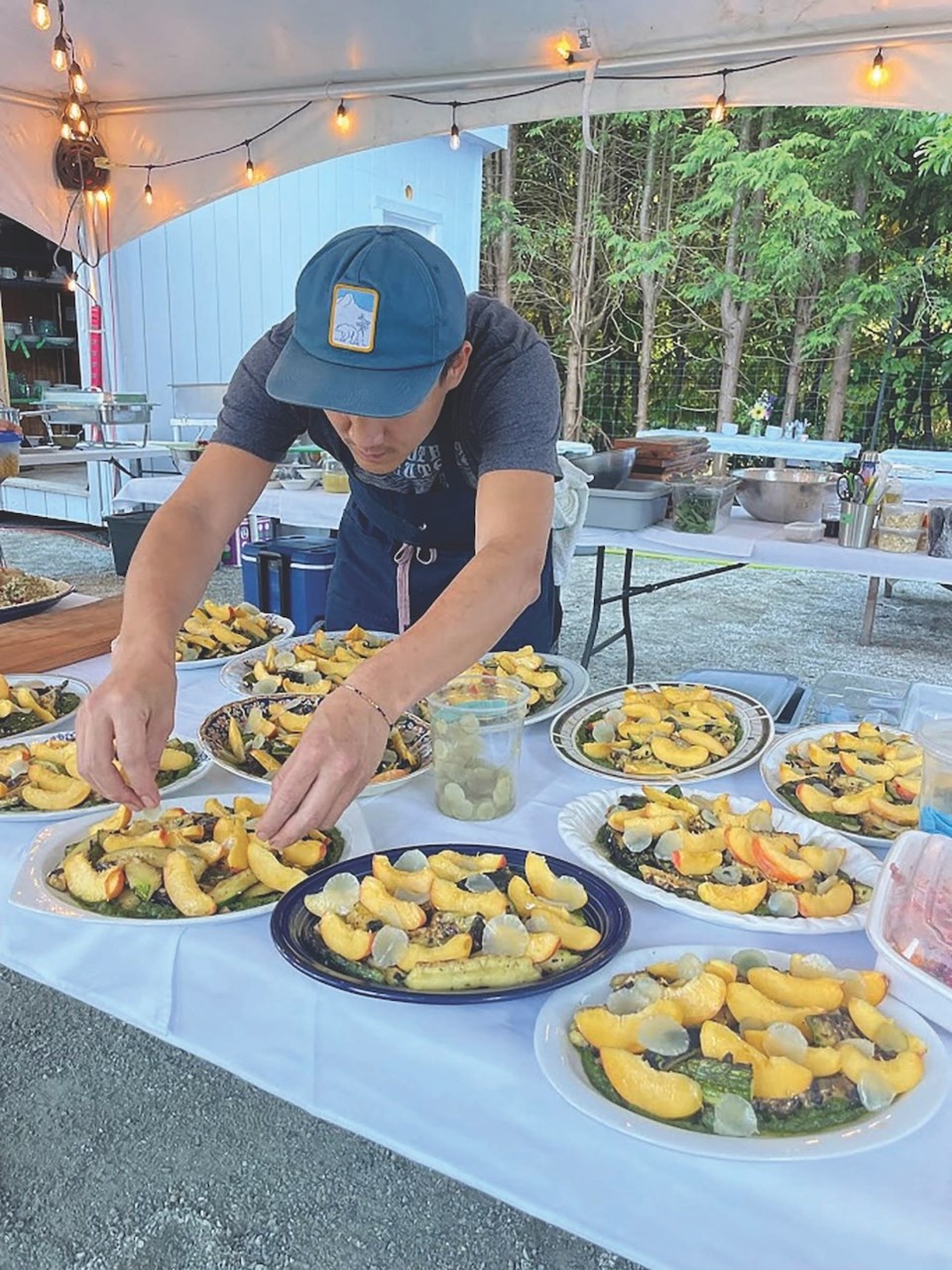How do we turn waste into a sustainable product? This question was raised by Jack Chen, former executive chef of Brassica in Gibsons, as we sat for a conversation at the Halfmoon Bay General Store. He recalled sitting in his basement after closing Brassica’s doors, staring at leftover product. It took time to preserve it properly but preserve he did — turning squash innards into miso, pulp into meals.
Jack was one of the chefs who contributed to One Straw Society’s Tiny Farm, Big Table dinner in July. Seated with friends, I heard stories about his brilliance with food and his ties to local farms, and I was intrigued.
His career spanned from making milkshakes at White Spot, to cooking around the world, to Vancouver’s L’Abattoir, where he met his wife, Hilary. After years of weekend visits, they moved to the Coast and opened Brassica.
At the time it closed, Brassica had just been shortlisted for best new restaurant in Canada. A friend congratulated him, then asked the real question: “Congratulations! But. Was it worth it?”
“It wasn’t,” Jack said with clarity.
He’d worked himself into exhaustion, taking nearly three months off to recover. It mirrored what I imagine many chefs, cooks, and servers are asking: is this pace survivable? Even at his breaking point, he felt he was letting people down. As he spoke, I felt the echo in my own life, on leave from my own career, staring at the same contradiction: the duty to others versus the duty to yourself. The cost of carrying it all is unsustainable — for Jack, for me, for the food system itself.
He was deeply concerned for farmers. Brassica’s farm-to-table commitment was real. That level of commitment requires thinking and acting differently: going to markets, building relationships, shifting menus toward what’s abundant. Want tomatoes in December? They must be processed now. It’s harder, more complicated — and better.
Farm-to-table looks good on Instagram, but behind the photo-ready veneer, farming itself is at risk. Am I willing to invest what’s required to keep it going? Do I treat the farmstand like a grocery store, upset when strawberries are gone? Or am I willing to show up at the end of the market, as Jack does, shopping for what’s in abundance, the food that would be left behind?
Honestly, it’s probably both. Some days, we just don’t have it. Which is why I wanted to end with simple ways to make shifts. It doesn’t have to be all or nothing. The time is now to buy fresh, local produce — and think ahead to how we’ll enjoy it months from now. Here’s an “arrive as you are” guide to stretching the harvest:
Level 1: “Produce Participation Trophy.” Literally just storage. I can do this.
• Cool dry: onions, garlic, potatoes, squash
• Cool humid: carrots, beets, parsnips, cabbage, pears, rutabagas, turnips, kohlrabi, radish, daikon, apples
Level 2: “Freezer Bag Hero.” Sliced? Bagged? Shoved it in the freezer? You just levelled up.
• Freeze straight: blueberries, blackberries, raspberries, strawberries (tops off)
• Slice & tray freeze: peaches, plums, nectarines, cherries, corn, zucchini
• Blanch then freeze: beans, broccoli, kale, spinach
Level 3: “Preservation Nation.” Fermentation, canning – the true potion master of the pantry. Also known as “traditional Creeker.” If you’ve reached this level, you clearly don’t need my list.
Let’s not forget dehydration, somewhere around Level 2.5, the gateway drug to canning. (And if you need a dehydrator, One Straw has one in their tool library.)
One Straw is also running workshops on fermentation, canning and other preservation methods all through the fall.
I’ll accept badges, XP points, or corrections for my food storage stats at [email protected] or on Facebook messenger.
Also, kohlrabi. In case you are wondering what’s left at the end of the Farmer’s Market. It’s kohlrabi. Try it next time.



